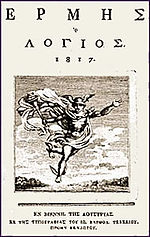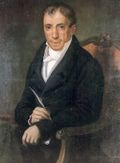- Modern Greek Enlightenment
-
 Hermes o Logios, Greek literary magazine of the 18th and 19th c.
Hermes o Logios, Greek literary magazine of the 18th and 19th c.
The Modern Greek Enlightenment (Greek: Διαφωτισμός, Diafotismos, "enlightenment," "illumination") was an ideological, philological, linguistic and philosophical movement among 18th century Greeks that translate the ideas and values of European Enlightenment into the Greek world.
Contents
Origins
Further information: Ottoman GreeceThe Greek Enlightenment was given impetus by the Greek predominance in trade and education, in the Ottoman Empire. Greek merchants financed a large number of young Greeks to study in universities in Italy and the German states. There they were introduced to the ideas of the European Enlightenment and the French Revolution.[1]. It was the wealth of the extensive Greek merchant class that provided the material basis for the intellectual revival that was the prominent feature of Greek life in the half century and more leading to 1821. It was not by chance that on the eve of the Greek War of Independence the most important centres of Greek learning, schools-come-universities, were situated in Ioannina, Chios, Smyrna (Izmir) and Ayvalik, all major centres of Greek commerce.[2]
Role of the Phanariotes
The Phanariotes were a small caste of Greek families who took their collective name from the Phanar quarter of Constantinople where the Ecumenical Patriarchate is still housed. They held various administrative posts within the Ottoman Empire, the most important of which were those of hospodar, or prince, of the Danubian principalities of Moldavia and Wallachia. Most hospodars acted as patrons of Greek culture, education, and printing. These academies attracted teachers and pupils from throughout the Orthodox commonwealth, and there was some contact with intellectual trends in Habsburg central Europe. For the most part they supported the Ottoman system of government, too much to play a significant part in the emergence of the Greek national movement; however, their support of learning produced many highly educated Greek scholars who benefited from the cosmopolitan environment the Phanariotes cultivated in their principalities.[3]
This environment was in general a special attraction for young, ambitious and educated Greek people from the Ottoman Empire, contributing to their national enlightenment. The Princely Academies of Bucharest and Iasi also played a crucial role in this movement. Characteristically the authors of the Geographia Neoteriki, one of the most remarkable works of that era, Daniel Philippidis and Grigorios Konstantas, were both educated in this environment.[4][5]
Aftermath
One effect was the creation of an atticized form of the Greek by linguistic purists, which was adopted as the official language of the state and came to be known as Katharevousa (purified). This created a diaglossa conflict with the more commonly spoken demotic Greek and was abandoned in the latter half of the 20th century.[1]
The transmission of Enlightenment ideas into Greek thought also influenced the development of national consciousness. The publication of the journal, Hermes o Logios encouraged the ideas of the Enlightenment. The journal's objective was to expose Greek people to contemporary European science, philosophy and culture. Two of the main figures of the Greek Enlightenment, Rigas Feraios and Adamantios Korais encouraged Greek nationalists to pursue contemporary European thought.[6]
Greek Enlightenment did not concern only language and the humanities but also the sciences. Some scholars such as Methodios Anthrakites, Evgenios Voulgaris, Athanasios Psalidas, Balanos Vasilopoulos and Nikolaos Darbaris had a background in Mathematics and the Physical Sciences and published or translated modern European scientific books into Greek for use in Greek schools. Rigas Feraios also published an Anthology of Physics.
Notable people and societies
- Adamantios Korais A witness of the French Revolution, Korais took his primary intellectual inspiration from the Enlightenment, and he borrowed ideas copiously from the philosophers Thomas Hobbes, John Locke, and Jean-Jacques Rousseau.
- Rigas Feraios Greek emigre to Vienna. He was an admirer of the French revolution and hoped to transplant its humanistic ideas to the Greek world.
- Neophytos Doukas (1760-1845), a scholar and prolific writer, who wrote about 70 books and rendered many ancient texts into Modern Greek.
- Filiki Eteria The Society of Friends in Greek, was a secret organisation working in the early 19th century, whose purpose was to overthrow Ottoman rule and to establish an independent Greek state founded on the humanist ideals of the Enlightenment. Many young Phanariot Greeks were among its members.
References
- ^ a b Encyclopedia Britannica, Greek history, Intellectual Revival, 2008 ed.
- ^ Encyclopedia Britannica, Greek history, The mercantile middle class, 2008 ed.
- ^ Encyclopedia Britannica, Greek history, Transformation toward emancipation, The Phanariotes, 2008 ed.
- ^ Kopeček, Michal (2006). Discourses of collective identity in Central and Southeast Europe (1770-1945): texts and commentaries. Central European University Press. pp. 73–79. ISBN 9789637326523. http://books.google.com/books?id=k5Vsjg508EYC&pg=PA74&dq=philippidis%2Bmilies%2Bgreek&hl=el&ei=PyIPTbbZFZTNjAelibW8Dg&sa=X&oi=book_result&ct=result&resnum=4&sqi=2&ved=0CDcQ6AEwAw#v=onepage&q=philippidis%20milies%20greek&f=false.
- ^ Sussex, Roland; John Christopher, Eade (1985). Culture and nationalism in nineteenth-century Eastern Europe. Slavica Publishers. p. 8. ISBN 9780893571467. http://books.google.gr/books?ei=oMYPTZOCG8eAswbmse30DA&ct=result&id=eQZpAAAAMAAJ&dq=%22Grigorios+Konstantas+in+their+New+Geography%22&q=%22Daniil+Philippidis+and+Grigorios+Konstantas+in+their+New+Geography+of+1791%2C+one+of+the+most+remarkable+works+of+the+%27Neo-Hellenic+Enlightenment%27%2C+%22#search_anchor.
- ^ M. Kitromilides, Paschalis (1979). The Dialectic of Intolerance: Ideological Dimensions of Ethnic Conflict. Journal of the Hellnice Diaspora. p. 4. http://triceratops.brynmawr.edu/dspace/bitstream/handle/10066/5243/Kitromilides_6_4.pdf;jsessionid=D85E79913BFF8FCAF6D4228BE8B3CEAC?sequence=1.
Dimitris Michalopoulos, "Aristotle vs Plato. The Balkans' Paradoxical Enlightenment",Bulgarian Journal of Science and Education Policy (BJSEP), 1 (2007), pp.7-15. ISSN 1313-1958.
See also
- Adamantios Korais
- Rigas Feraios
- Filiki Eteria
- Theophilos Kairis
- Eugenios Voulgaris
Modern Greek Enlightenment Publications Geographia Neoteriki • Hellenic Nomarchy • Ephimeris • Hermes o Logios
Academies Ottoman Empire: Athonite Academy • Evangelical School • Kaplaneios • Maroutsaia • New Academy • Phanar Greek Orthodox College • Phrontisterion of Trapezous
Diaspora: Flanginian School • Princely Academy of Bucharest • Princely Academy of IaşiRepresentatives Cosmas of Aetolia • Rigas Feraios • Anthimos Gazis • Theophilos Kairis • Dimitrios Katartzis • Theodore Kavalliotis • Grigorios Konstantas • Adamantios Korais • Veniamin Lesvios (fr) • Iosipos Moisiodax • Daniel Philippidis • Athanasios Psalidas • Eugenios Voulgaris • Nikephoros Theotokis • Athanasios Stageiritis • Kosmas Balanos • Methodios Anthrakites • Neophytos Doukas • Balanos Vasilopoulos
National revivals during the 19th century In the Ottoman Empire: Albanian · Arab · Armenian · Bulgarian · Greek · Macedonian · Romanian · Serbian · Turkish
Russian Empire: Estonian · Finnish · Latvian · Lithuanian
Germany and Habsburg lands: Croatian · Czech · Hungarian · German Vormärz · Italian · Polish
Spain: Asturian · Basque · Catalan
other Romantic nationalism: Irish (Celtic) · · Norwegian
Figures in the Age of Enlightenment by country or region Notable figures America (English) America (Latin) England Edward Gibbon · Thomas Hobbes · Samuel Johnson · Edmund Burke (Irish born) · John Locke · Isaac Newton · Robert WalpoleFrance Germany Greece Hungary Italy Low Countries Poland-Lithuania Portugal Romanian States Russia Scandinavia Scotland Serbia Spain Ukraine Related topics Categories:- Greek Enlightenment
- National revivals
- The Enlightenment
- History of philosophy
Wikimedia Foundation. 2010.

